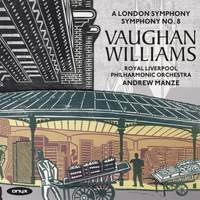Recording of the Week,
Andrew Manze begins a cycle of symphonies by Vaughan Williams
This week sees the release of the first volume in Andrew Manze's Vaughan Williams symphony cycle with the Royal Liverpool Philharmonic Orchestra. Manze is perhaps better known as a violinist than as a conductor, but he's certainly no stranger to the podium, having conducted orchestras all over northern Europe and in the USA to great acclaim. Still, few would deny that he has some enormous shoes to fill, with Hickox and Handley's cycles inevitably dominating the discography.
He's chosen to begin with Nos. 2 (A London Symphony, in its rarely-heard 1920 version) and 8, starting his set off with a double-bill. The London competes with No. 5 for the top spot in my affections – the latter being more romantic, more spiritual but perhaps less lively and vivid. Vaughan Williams seems to have been ambivalent about how programmatic the London is, but at the very least the use of the Westminster chimes at the beginning and end of the work gives a clear sense of place.

Most of the section principals have prominent passages during the course of the symphony – the clarinet and horn making early appearances in the introduction. While it would be wrong for these sections to be played too indulgently, Manze's musicians nevertheless bring the meditative lines out of Vaughan Williams' instantly-recognisable harmonic writing with great beauty. The bittersweet harp-accompanied string sextet near the end of the first movement is particularly exquisite – the opening of this interlude is probably my single favourite moment on this whole disc.
If I have a criticism of Manze's interpretation, it's of the second movement. The climax of the Lento (and to a lesser extent the Finale) left me longing for more – it's powerful, but in Manze's hands it's not so much impassioned as noble and majestic. Perhaps I'm allowing Handley's account to cloud my judgement – and of course it's a matter of taste – but personally I felt myself wishing for a greater sense of yearning from those sweeping tuttis.
I almost regret having to mention that minor grumble, because this really is an excellent performance. Vaughan Williams' orchestration is fantastically colourful – he had studied with Ravel a few years previously, and clearly took great inspiration from him both in terms of harmony and in terms of instrumentation – and Manze brings its subtleties out in a way I've never heard anyone else quite manage before. The Scherzo is as lively as anyone could wish for, and its central section does seem to evoke, as Vaughan Williams suggested, the bustle of a Westminster evening. The Epilogue, likewise, captures the nostalgic spirit that the composer suggested – the passing into history of "England and the Kingdom, Britain and the Empire, the old prides and the old devotions", denoted by the valedictory reappearance of the chimes.
The Eighth Symphony is less well-known – a rather experimental work in terms of sonority, in which not only is the tuned percussion hugely expanded (as the opening bars make clear, with the haunting sound of the vibraphone alternating between two evasive chords) but the central movements showcase the orchestra's sections. Perhaps the wind section are a little short-changed – their lively, march-like movement is less than four minutes long, while the strings have nearly ten minutes for their wistful Cavatina. If anything, though, I prefer the former, because it gives me yet another chance to wax lyrical about how fine the RLPO's wind players are. The ensemble, tuning and balance are all immaculate – if, as some have suggested, this movement is a nod to the British military band tradition, then the RLPO's 'band' is second to none.
I said earlier that Handley and Hickox were a hard act to follow, and that's still true – but if this first volume is anything to go by, Manze could well be on track to join them in the pantheon of Vaughan Williams interpreters. Particularly in the case of the London, it really feels like he's got under the skin of the work – those solo passages are an important part of its character, and one that he brings out well. I'll be looking forward to the next instalment next spring!
Royal Liverpool Philharmonic Orchestra, Andrew Manze
Available Formats: CD, MP3, FLAC, Hi-Res FLAC



